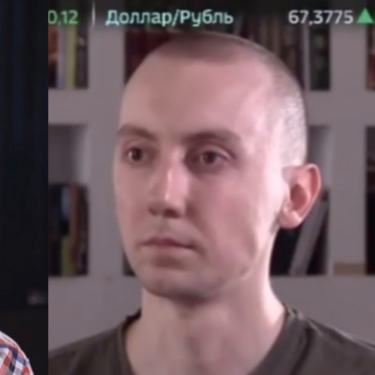RSF urges Russian and Belarusian authorities to end practice of forced confessions by journalists

A month after Belarusian journalist Raman Pratasevich’s spectacular arrest and his three subsequent forced public confessions of guilt, Reporters Without Borders (RSF) condemns the return of forced confessions in Eastern Europe and urges the authorities to put an immediate end to this practice.
Читать на русском / Read in Russian
Ten days after his arrest, a tearful and haggard Pratasevich, his wrists visibly injured by handcuffs, confessed on camera to the Belarusian state TV channel ONT that he was guilty of disturbing public order and pledged “unconditional respect” for President Alexander Lukashenko.
A couple of weeks later, the former editor of the Telegram news channel NEXTA repeated the exercise at a news conference organised by the foreign ministry alongside a high-ranking military officer of the Air Force, the spokesman of the foreign ministry and two members of the government. He told fellow journalists that he had “not been mistreated in prison” and confessed to having “caused harm” to the Belarusian state.
Appalled by this grotesque show, journalists walked out in protest, and in support for the 26-year-old journalist, who completes a month in detention today.
Pratasevich’s forced confessions are not an isolated case. When the Ukrainian journalist Stanislav Aseyev watched them, he said he had “the impression of looking in a mirror.” Pratasevich’s tears at the end were “perhaps the only sincere thing in this interview,” he added.
Aseyev should know. A freelancer for Ukrainian media outlets and for Radio Svoboda, the Russian service of US-funded Radio Free Europe/Radio Liberty (RFE/RL), he was one of the few independent journalists to stay in the eastern city of Donetsk when Moscow-backed separatists seized control there. After being detained by the separatists for a year, he “confessed” on the Russian state TV channel Rossiya 24 that he had spied for Ukrainian intelligence.
Vladislav Yesipenko, the local correspondent of RFE/RL’s Crimean service, Krym.Realii, has had a similar experience. After being arrested and tortured for ten days in March 2021, he “confessed” on camera to the local Russian TV channel Krym24 that he had spied for the Security Service of Ukraine (SBU) and had illegally made weapons. As was the case with Pratasevich and Aseyev, his news coverage and investigative reporting had annoyed the local authorities.
“The humiliating practice of forced confessions recalls the Soviet era’s darkest hours,” said Jeanne Cavelier, the head of RSF’s Eastern Europe and Central Asia desk. “As well as trampling on journalistic ethics, these absurd shows violate article 14 – on fair trials – of the International Covenant on Civil and Political Rights, to which both Belarus and Russia are party. We urge Minsk and Moscow to put a stop to this practice in order to respect the international legal norms they signed up to. Treating journalists as spies puts their work and their lives in danger. We call for the immediate release of Raman Pratasevich et Vladislav Yesipenko.”
The forced confession set-up is always the same. No concrete information is provided about the conditions in which the journalists are detained or what exactly they are alleged to have done. The journalists seem unable to express themselves freely and show signs of mental and physical exhaustion. The staged confession always takes place on state TV or with officials in attendance. And it is part of a disturbing deterioration in press freedom in the country concerned.
Belarus is ranked 158th out of 180 countries in RSF's 2021 World Press Freedom Index, Russia is ranked 150th and Ukraine is ranked 97th.



